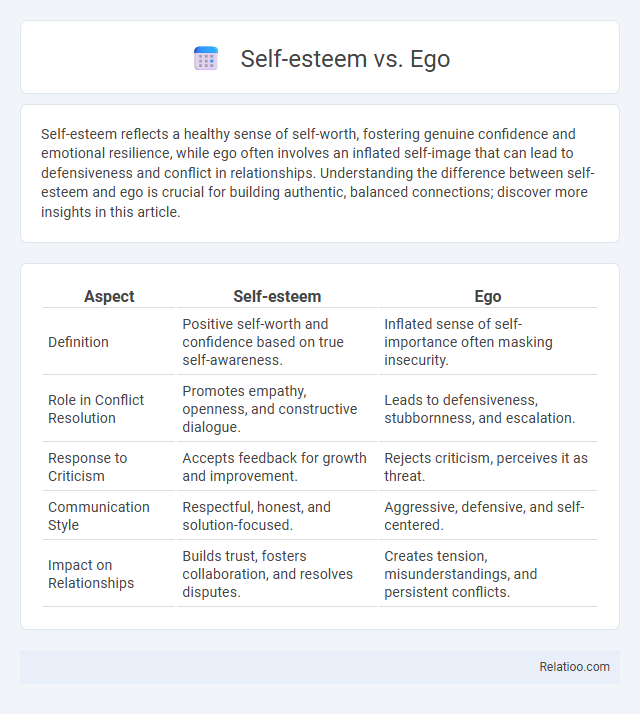Self-esteem reflects a healthy sense of self-worth, fostering genuine confidence and emotional resilience, while ego often involves an inflated self-image that can lead to defensiveness and conflict in relationships. Understanding the difference between self-esteem and ego is crucial for building authentic, balanced connections; discover more insights in this article.
Table of Comparison
| Aspect | Self-esteem | Ego |
|---|---|---|
| Definition | Positive self-worth and confidence based on true self-awareness. | Inflated sense of self-importance often masking insecurity. |
| Role in Conflict Resolution | Promotes empathy, openness, and constructive dialogue. | Leads to defensiveness, stubbornness, and escalation. |
| Response to Criticism | Accepts feedback for growth and improvement. | Rejects criticism, perceives it as threat. |
| Communication Style | Respectful, honest, and solution-focused. | Aggressive, defensive, and self-centered. |
| Impact on Relationships | Builds trust, fosters collaboration, and resolves disputes. | Creates tension, misunderstandings, and persistent conflicts. |
Understanding Self-Esteem: A Foundation
Understanding self-esteem is crucial as it represents your overall sense of personal worth and confidence, distinct from ego, which often involves pride or self-importance. Self-esteem serves as the foundation for healthy emotional resilience and authentic self-acceptance, enabling you to navigate challenges without reliance on external validation. Building strong self-esteem fosters genuine self-respect, while an inflated ego may mask insecurities rather than promote true personal growth.
Defining Ego: More Than Just Confidence
Ego represents your sense of self-importance and identity, extending beyond mere confidence to encompass how you perceive your value in relation to others. Unlike self-esteem, which reflects an inner sense of worth and acceptance, ego often drives behavior aimed at maintaining status or superiority. Understanding the distinction helps you foster healthy self-esteem without letting ego dictate your interactions or self-image.
Key Differences Between Self-Esteem and Ego
Self-esteem reflects an individual's overall sense of self-worth and confidence based on genuine self-acceptance and achievements, while ego often relates to a person's self-importance and need for external validation. Key differences include self-esteem fostering inner peace and resilience, whereas ego can lead to defensiveness and pride. Understanding these distinctions helps promote healthier psychological well-being by emphasizing authentic self-respect over superficial self-image.
Signs of Healthy Self-Esteem
Healthy self-esteem is characterized by a balanced sense of self-worth, confidence in your abilities, and the ability to accept both strengths and weaknesses without excessive self-criticism. Unlike ego, which often manifests as arrogance or defensiveness to protect fragile self-image, healthy self-esteem promotes resilience and genuine self-acceptance. You can recognize healthy self-esteem by your openness to constructive feedback, consistent self-respect, and empathy toward others.
Indicators of an Inflated Ego
Indicators of an inflated ego include constant self-praise, difficulty accepting criticism, and a need to dominate conversations or social settings to feel superior. Unlike genuine self-esteem, which is rooted in self-acceptance and balanced confidence, an inflated ego often masks insecurity and leads to defensive behavior when challenged. Understanding these signs can help you differentiate between authentic self-worth and ego-driven arrogance.
How Self-Esteem Shapes Relationships
Self-esteem fundamentally influences the quality of relationships by fostering trust, communication, and emotional resilience, unlike ego, which often creates conflicts through defensiveness and competition. High self-esteem promotes empathy and genuine connection, enabling individuals to set healthy boundaries and express needs without fear of rejection. Research shows that people with balanced self-esteem experience greater relationship satisfaction and stability compared to those driven by ego-centric behaviors.
The Impact of Ego on Personal Growth
Ego often hinders personal growth by creating resistance to feedback and fostering defensiveness, which limits self-awareness and adaptability. Unlike healthy self-esteem grounded in realistic self-appraisal, an inflated ego exaggerates one's abilities and resists acknowledging mistakes, stalling development. Cultivating self-esteem through humility and openness encourages learning, resilience, and meaningful progress in personal growth.
Building Self-Esteem Without Fueling Ego
Building self-esteem involves developing a genuine sense of self-worth based on personal values and achievements rather than external validation. Unlike ego, which often relies on comparison and superiority, healthy self-esteem fosters confidence without arrogance or defensiveness. Emphasizing self-compassion and realistic self-assessment encourages growth and resilience without inflating the ego.
Overcoming Ego for Inner Peace
Overcoming ego is essential for cultivating genuine self-esteem and achieving inner peace, as ego often fosters defensiveness and distorted self-worth. True self-esteem arises from accepting oneself without comparison or ego-driven validation, promoting emotional resilience and balanced self-perception. Practices such as mindfulness, self-reflection, and humility help diminish the ego's influence, enabling deeper self-awareness and lasting tranquility.
Self-Esteem vs Ego: Finding the Right Balance
Self-esteem reflects a realistic and appreciative understanding of one's own worth, fostering confidence and emotional resilience, whereas ego often centers on an inflated sense of self-importance that can lead to defensiveness and conflict. Balancing self-esteem and ego involves cultivating self-awareness and humility to maintain healthy relationships and personal growth. Recognizing the difference allows individuals to build genuine self-esteem without tipping into egotism.

Infographic: Self-esteem vs Ego
 relatioo.com
relatioo.com